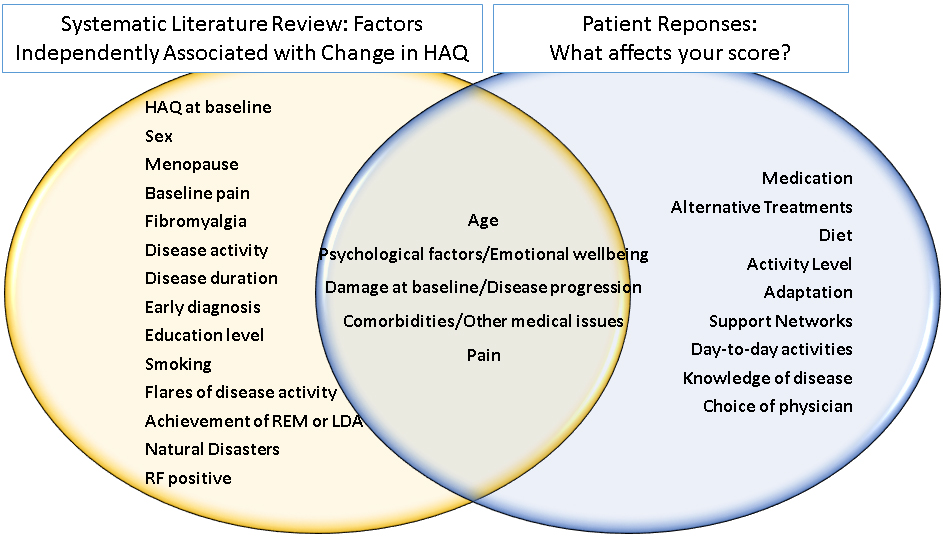Session Information
Session Type: Abstract Session
Session Time: 12:00PM-12:50PM
Background/Purpose: The ACR Quality of Care committee is working to develop a quality measure to reflect functional assessment in rheumatoid arthritis (RA). One proposed approach is to measure functional status over the course of one year. Scores on currently available functional status instruments may be affected by factors other than RA (e.g. comorbidities). The objective of this study was to identify factors associated with change in measures of functional status in RA. We used a mixed methods approach in which we performed a systematic literature review (SLR) followed by two focus groups to examine patients’ perspectives.
Methods: In the SLR, we identified studies examining independent predictors of functional change as measured by the health assessment questionnaire (HAQ), multidimensional HAQ (MDHAQ), or PROMIS physical function in longitudinal studies. Next, we conducted two focus groups at different sites to elicit patients’ views on what may affect scores and change in scores on functional status measures, using the MDAHQ as the example functional status instrument. Focus groups were audio-taped, transcribed, and analyzed via content analysis in NVivo, the code list was iteratively refined.
Results: In the SLR, all studies meeting inclusion criteria utilized the HAQ as the outcome of interest. Statistically significant factors associated with change in HAQ included disease activity, treatment of RA, disease duration, age, baseline activity level, adaptation, stress, mood, lifestyle factors (in particular smoking), education level, and comorbidities. Two focus groups with 3 and 5 patients with RA, respectively were conducted. Patients described factors that influenced functional status scores which included family responsibilities, types of activities participated in during the week (i.e., child care, cooking, cleaning, physical activity), seasonal variation, having a good relationship with the rheumatologist, having a responsive rheumatologist, and the patient’s understanding of their disease (i.e., expectations about improvement, understanding what may be related to the disease, etc). While patients identified with some of the questions in the MDHAQ, they felt that many important activities/functions were missing and that function should be more broadly defined and incorporate facets of participation, in particular work and social participation. Patients also felt that stable function over a year was an acceptable performance measure, however, they also stressed the importance of incorporating individual patient goals (i.e., a newly diagnosed patient with early disease and moderate disease activity would be expected to improve over one year whereas an elderly patient with significant disease-related damage may be happy staying the same).
Conclusion: In RA, several external factors affect both static scores and change in measures of functional status. Patient focus groups provided additional factors to those identified in the literature. This study demonstrates the importance of engaging patients in development of quality measures.
 Figure 1. Factors that affect change in functional status measures: findings from a SLR and patient focus groups
Figure 1. Factors that affect change in functional status measures: findings from a SLR and patient focus groups
To cite this abstract in AMA style:
Hopkins Gillespie S, Fraenkel L, Suter L, Schmajuk G, Katz P, Limanni A, Ogdie A. Engaging Patients in the Development of a Quality Measure of Functional Status to Improve Care Among Patients with Rheumatoid Arthritis [abstract]. Arthritis Rheumatol. 2020; 72 (suppl 10). https://acrabstracts.org/abstract/engaging-patients-in-the-development-of-a-quality-measure-of-functional-status-to-improve-care-among-patients-with-rheumatoid-arthritis/. Accessed .« Back to ACR Convergence 2020
ACR Meeting Abstracts - https://acrabstracts.org/abstract/engaging-patients-in-the-development-of-a-quality-measure-of-functional-status-to-improve-care-among-patients-with-rheumatoid-arthritis/
